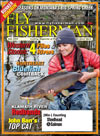One of the questions I get asked a lot is, "What lure works best for trout fishing?" Of course there are different variations of this question, such as "What lure works best in lakes?", etc.
While the question is simple enough, the answer is not. There are too many different variables involved in fishing to say that one lure works best. In fact, one of the biggest frustrations in trout fishing is that one lure may work great one day and not all the next. Why? There are a lot of possible reasons for this.
Several variables affect trout fishing including:
- Water temperature
- Water clarity
- Water color
- Weather conditions (sunny, cloudy, windy, rain, ice, snow, etc.)
- Season (spring, fall, winter, summer)
- Available food sources
- Pressure from other anglers
These are only a few of the variables which affect trout fishing. And of course, each of the variables mentioned above not only affect trout, but also your lure selection. The reason why is too complicated to explain in a blog post, but are addressed in the
Trout Fishing Tips eBook.
But in short, the variables mentioned above affect how your lure looks underwater to trout. These variables also influence trout activity and
feeding habits.
Trout are sluggish in very cold water and therefore might need a bit more flash to entice them into striking. And yet too much flash, might scare them off.
Water color and clarity can affect a trout's ability to see your lure. A bright red lure in your tackle box will appear black in blue water. That's because red is filtered out in blue water. The deeper the lure is fished, the blacker it will appear under water. This is just one example of how water color and clarity can affect how trout see your lure under water.
Advanced anglers have observed that
dark colored lures tend to work well on overcast days, murky water and when fishing at night. Likewise, nickel and silver lures tend to work better on bright sunny days.
These are some of the reasons that a lure may work well one day and not the next. There's just too many variables involved in fishing.
The real key to successful trout fishing is to understand trout: their physical needs as well as how their environment affects them. This understanding will help you in turn better understand how different lures, baits, and fishing tactics affect your ability to catch trout.
Advanced anglers will pay attention to all of these factors and take note of what lure, bait or fishing tactic worked given a certain set of conditions. Often times, they will keep track of these details in a fishing log or
fishing software program. After a while, they'll start to notice trends which will help them make better lure selections, etc.
So while there's no real answer to the question, "What lure works best for trout fishing?", hopefully the information above will help you understand some of the variables affecting your lure selection.


